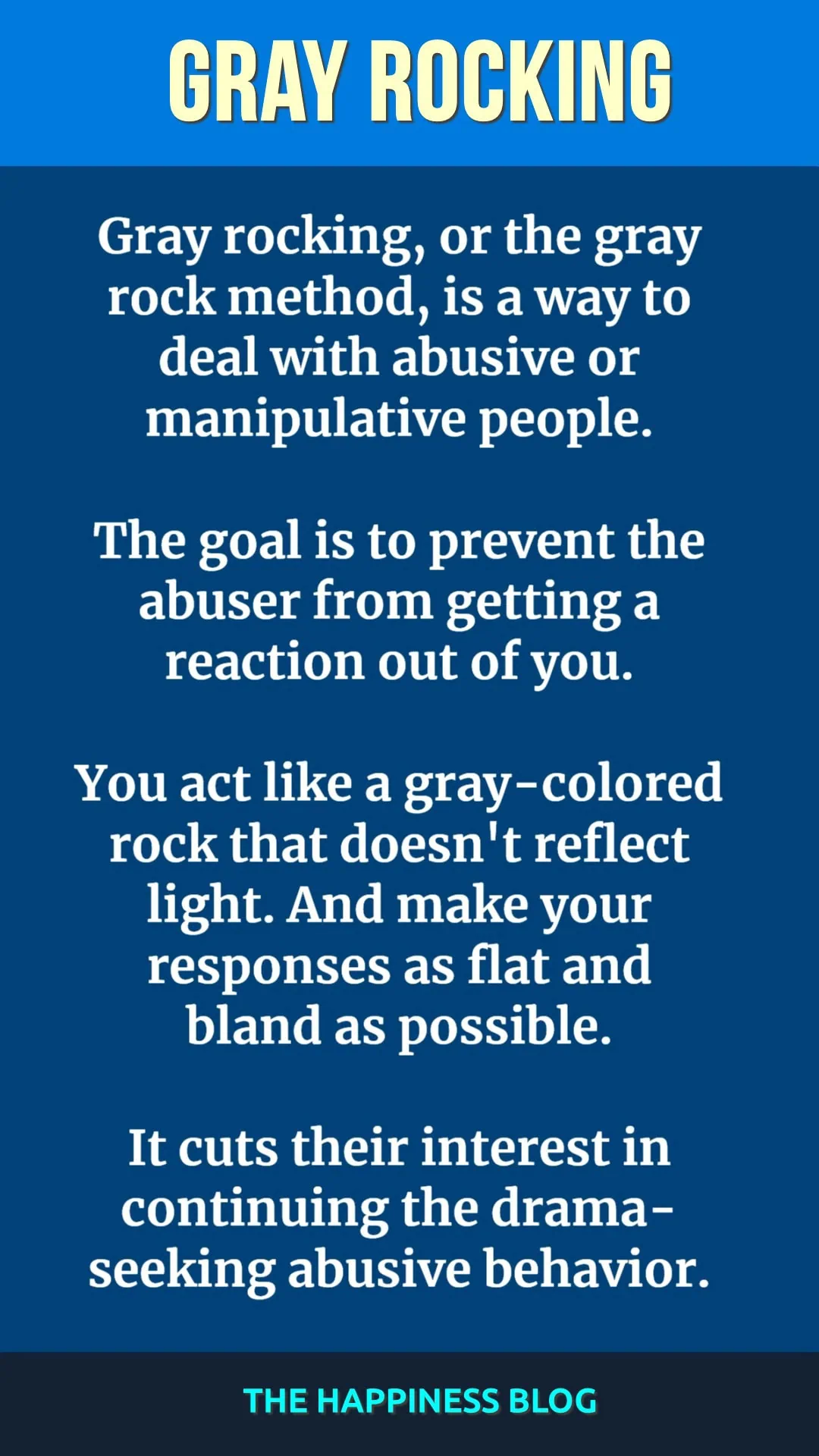Today's Saturday • 8 mins read
— By Dr. Sandip Roy.
The gray rock method is a highly effective, smart, and safe way to protect your mental peace from a narcissistic husband.
What’s it, and how to make it work the best?
The gray rock method also works in friendships, professional relationships, casual acquaintances, and other toxic people. So, learning it will help you preserve your “psychological safety.”
The article “The Gray Rock Method of Dealing With Psychopaths” was the first to use the phrase “Gray Rock.”
Although not formally researched, many victim-wives have attested to its usefulness, and some mental health experts recommend it. We think scientists will put it to the test soon.
What is the gray rock method?
Gray rocking means acting like a gray-colored stone that doesn’t react to anything said or done to it. In a real sense, you ignore a manipulative person’s attempts to engage you in an emotionally charged drama.
You simply refuse to give them the drama they come looking for.

- Gray rocking mainly serves to push toxic people into leaving you alone. They get bored when you don’t make eye contact, listen with a “flat face,” or reply with the shortest sentences, and leave.
- It’s also a subtle defensive strategy. Your gray rocking tells the person who offended you, but refuses to apologize, that you are unaffected by anything they do, good or bad.
Surprisingly, the narcissist can also use the gray rock method to make his co-dependent relationships feel insecure and irrelevant.

How To Gray Rock Your Narcissist Husband (And Other Toxic People)
You may use the gray rock technique to drama-seeking narcissists, such as your spouse, parent, or other family member.
Here is how to gray rock anyone:
1. Show no emotions.
First rule: Project an emotionless face; no anger, surprise, or distress. Simply a stoic expression.
Let the narcissist think, “I was expecting her to scream and shout, but she’s simply sitting there, stone-faced.”
Avoid interacting with them unless you have to.
And when you have to interact with them, keep your interactions matter-of-fact and emotion-free. Stay impersonal and don’t let your voice or face reveal your feelings.
Keep your responses purely transactional and steer clear of stray talks.
Give one-word replies, like “Yes,” “No,” or “Okay.”
Even when they talk excitedly or yell at you, refrain from showing any emotional reaction.
Observe in the mirror how you appear when you feel anxious, fearful, depressed, or frustrated, and then try putting on a deadpan expression.
Practice how to switch from expressive to emotionless in a matter of seconds.

2. Close your posture.
Never project to the narcissist a low level of power through your body language.
Studies show that high-power people act uninhibitedly and are less accurate judges of their partner’s emotions. Whereas low-power persons behave in a more inhibited, indirect fashion, and report more self-conscious and anxiety-related emotions.
Research has found that anxiety reduces your perceived ability to act and induces withdrawal behaviors. This means, when you are anxious, you lose some of your ability to act, and tend to retreat.
A tense body posture may trigger negative feelings in you, such as anxiety and fear.
So, don’t stand scared stiff before the narcissist, as it can actually make you less capable and less willing to act.
Rather, exude authority and gravity in your stance.
Don’t fidget or make any sudden gestures of wincing or turning away. Maintain a steady closed stance, arms across your torso, and listen to them uninterested.
3. Don’t look them in the eyes.
Looking into an angry narcissist’s eyes can evoke instant fear, even before you realize it.
Fox & Lester’s research showed that our brains can rapidly and efficiently detect angry facial expressions.
This study found that looking into the eyes of others strongly activates the amygdala, the brain part linked to emotion, punishment, reward, and attention.
Once your narcissist sees the fright in your eyes and senses you are losing your nerves, they will intensify their yelling and gesturing to subdue you, and then make you obey them.
Moreover, narcissists are charming with their eyes and facial mannerisms. They can entice you in seconds, especially if they know what expression of theirs gets you floored.
So, look away from them, away to a side wall, or down toward the floor.
- Interesting fact: Peering into the eyes of children with Autism Spectrum Disorder (ASD) triggers a strong fear response. If a child has higher amygdala volume at age 3, it predicts poorer social adjustment at age 6 (Lieberman, 2013).
4. Detach your mind.
Gray rocking is not suppressing your emotions.
It is detaching yourself so much from the situation that their words stop making sense and therefore incapable of drawing any reaction.
Pull up interesting memories, let your mind wander to interesting places, or imagine funny things like they are donkeys who are braying incoherently.
This is where the stage of psychological detachment begins.
5. Tell them you have a task.
Calmly ask them a few times if they are finished so that you can go on to “another important task.”
Be careful to have thought out a specific task because they will most likely ask you about it.
Asking them if they have finished so that you can attend to a pressing matter might be helpful. It may be safe to say, “If you’re done, I can use the restroom urgently.”
6. Leave at the first chance.
Your entire arsenal of apathy and aloofness bores them. It makes them think or utter, “It’s no use wasting my breath on her. She just does not understand what I am saying.”
That is your moment of escape and victory. Be four steps away before finishing your “Okay, I am leaving now.”
Narcissists are experts at turning the argument and making you feel like you are the wrong one. You must know how to correctly argue with a narcissist.
7. Use it only temporarily.
Gray rocking is a short-term tactic. You cannot do it all the time.
Ideally, its ultimate goal is to give you a few breaks so that you find a more permanent solution.
Repeated gray rocking may cause your narcissist husband’s rage to rise to vicious levels.
Remember, they do not have the empathy to realize that your gray rock method is to get them to change their behavior. They are unlikely to change without professional counseling.
The best and most permanent method to deal with a narcissist is to go “No Contact.”
How Narcissists React When You Gray Rock Them?
The idea behind gray rocking a narcissist is to give them the control and attention they desire, but at such meaningless levels that they find it useless.
So these are some ways your narcissist may react to gray rocking:
- They get angry that you are not responding to their queries and efforts to engage you.
- They may throw a few verbal insults at you, and even try to do things that irritate you.
- Eventually, when they notice you aren’t reacting to any of their dramatics, they leave.
- They might resort to silent treatment and ghosting to get back at you.
When to “not” use the gray rock strategy?
Avoid using the gray rock method with your narcissist husband when he is physically more powerful, aggressive in nature, or keeps an antagonistic stance with everyone.
The gray rock strategy may drive away some abusers, but it does not work for everyone.
You cannot use the gray rock method with some narcissistic people because it is not only ineffective but also risky.
The narcissist who is physically, socially, economically, or politically more powerful than you can get furious and assault you in a fit of narcissistic rage when you gray rock them.
Do you think you can gray-rock a dictator without endangering yourself? No.
In such instances, either quickly get yourself to safety or react with such force that they back off.
Final Words
The main point of gray rocking is to disengage the narcissist without triggering their anger or getting yourself into a dispute.
Is it the right thing to do? Yes, because pushing away someone who keeps you constantly under the fear of their wrath is ultimately an act of self-love.
The best advice is to spot the narcissist from a distance, avoid getting too close to them, and leave them, even when you have no money.
Get professional help to rebuild your courage and decisiveness. Use the gray rock method to stay safe until you can leave them.
• • •
√ Also Read: What Is Trauma Bonding With A Narcissist (How To Break It)?
√ Please share it with someone if you found this helpful.
» You deserve happiness! Choosing therapy could be your best decision.
...
• Disclosure: Buying via our links earns us a small commission.
